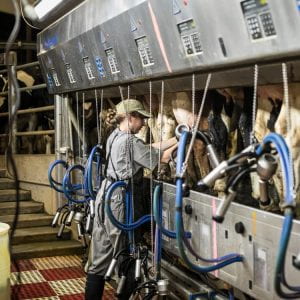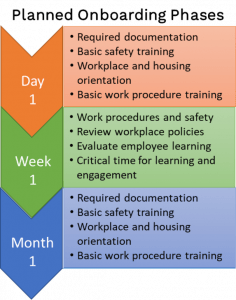Published with permission from Cornell Ag Workforce Development.
Have you noticed that some farms have had the same employees for years, while others struggle to keep employees? Employee retention can be a challenge in agriculture. Recent research on large dairy farms indicates annual employee turnover rates range from 20 to 80 percent. The first days and weeks on the job set the course for a new farm employee. Given the tight labor market, a successful onboarding program can be an essential tool to help reduce employee turnover, increase employee safety and productivity, and contribute to a farm’s success.
New employee onboarding is a management process to bring new employees into the farm business, complete necessary paperwork, equip them with safety and performance knowledge and skills, and make them feel connected to a worthwhile team. Onboarding should focus on the new employee as a person, not just as a worker, and not just on the business.
If an employee has a positive onboarding experience, their likelihood of staying at the place of employment for more than three years is about 69 percent, according to the Society for Human Resources Management. In addition to less turnover, employees are approximately 50 percent more productive and 54 percent more engaged.
Conversely, if an employee is poorly onboarded, this sets employees up for failure. The first impression can be the make or break of whether that employee returns tomorrow or leaves as soon as they can find another job. The onboarding process can help eliminate that experience and serve as a positive experience for the new hire. From the employer perspective, much is gained.
“A successful onboarding process begins with a well-planned orientation, training and compliance, and leads to improvements that benefit both the manager and employees throughout the relationship,” said Dr. Richard Stup, Cornell Agricultural Workforce Specialist.
Identified as a priority by New York’s Ag Workforce Development Council, Cornell Ag Workforce Development is developing a new onboarding project that was funded in 2019 by the New York Farm Viability Institute. The project “Safe, Productive and Engaged from Day One” focuses on developing tools, trainings and templates to help navigate employment requirements and improve human resource management practices.
Agriculture Workforce Development’s Onboarding Template helps you quickly develop a complete onboarding program with orientation and training that:
- Ensures compliance with basic regulations and policies.
- Provides clarification on work procedures and expectations, and offers safety training.
- Establishes a workplace culture based on values, philosophies and traditions.
- Creates connected relationships at work that allow employees to engage and thrive.
An effective onboarding program will:
- Establish a farm culture that is safe, productive and engaging.
- Set clear, upfront job expectations that employees can fully understand.
- Provide immediate safety training to avoid injuries.
- Promote compliance with all employment regulations.
- Communicate important farm policies and procedures, especially those that may differ from previous employers.
- Overcome language barriers so that everyone can understand each other.
- Increase employee commitment and reduce turnover.
- Provide accessible and realistic support for farm onboarding, even when labor and time are in short supply.
Over the next year, the Cornell Ag Workforce Team will partner with 25 dairy farms to develop onboarding materials, trainings and methods. We are looking for more farms to participate! If your dairy is looking for a way to improve employee retention and increase overall productivity of employees, please contact Mary Kate Wheeler for more information about this exciting program.
The mission of Cornell Ag Workforce Development is to help farms and agribusinesses build committed and effective teams who will carry out the important work of feeding the world. We believe that agricultural work can, and should be, engaging and rewarding for everyone involved. Managers can build committed teams by applying the best human resource management practices for the agricultural setting.


